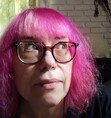Representation isn’t a bunch of boxes to check
When people ask me about my books and characters, they* sometimes talk about representation. “Why did you choose Merrick [my first book’s MC] to be a white guy from an obviously well-off family, but Lucee [second book’s MC] is a Black woman? You’re not either of these things.”
[*this is usually other white people asking me this, right]
Well, yeah. I don’t have to be represented by any of my characters in order to write about them and their lived experiences.
Being a writer requires a lot of skills. Some of the most important, in my opinion, have to do with empathy and understanding how people and society works. You can have an amazingly tight and engaging plot, but if you don’t write your characters well, the story will fall flat.
No one would blink if I wrote all my protagonists as white straight women. Even if they were substantially younger or older than me, more or less attractive, smarter or duller, or came from a very different socio-economic background – people wouldn’t comment or question it.
But the thing is, the world doesn’t just look like me. [despite some people constantly defaulting to white as the standard]Representation isn’t a bunch of boxes to check off. Diversity isn’t something you add because you’re “supposed to.” It should be the standard, because that’s what the world looks like – especially if you’re someone who looks like me, a “standard” that came from an unbalanced worldview built on privilege and racism. The default isn’t white. Nor is it able-bodied, neurotypical, cisgendered, or heterosexual.
My characters, magical or not, represent the reality around them: people from different backgrounds, economic statuses, communities, and cultures, all living their everyday lives. Entangled, at odds or in love, working together or on opposite sides, Fae or mortal or something else – they all have a place in my stories, just as they do in the world outside of them.
What kind of writer would I be if I only focused on characters that looked like me, or had my lived experiences? Not a very interesting or realistic one, in my opinion. Merrick is a white guy from an upper middle class family, smart enough but a bit spoiled, and able to live a directionless life because of that. It shapes why he makes the decisions that he does when he’s given the choice to be a part of something bigger, and gives us the opportunity to see him grow as a person.
Lucee is a Black woman who has leaned on her friendship with Merrick in the past as a kind of buffer between her overly controlling father and her own wishes for her life. She comes into her own power and ends up taking on a leadership role despite believing that she’s not good enough to do so. Her battle to overcome her low self-esteem is one I think a lot of people can relate to.
Denny struggles with deep self-worth issues and feeling comfortable in their own skin as a non-binary person. Because of this, they’ve allowed themself to be controlled by someone who wants to use them for their own benefit, and a good deal of their struggle is learning how to break free from that situation and mindset.
I think all these characters are relatable and bring different things to the table. That’s not even touching on Vali, who went through the foster system and was unhoused before coming to The Maithe, or Emmaline, a disabled woman with a debilitating chronic illness, or Aisling and Camlin, both Fae who faced rejection by their people for not being “pure” enough. Or Peri, who only wants to be valued for who she is, not what her powers can do for others.
I’ve known all these people. I want their stories in my world to be amplified. That’s why I write what I do.
[images are from Picrew and just for fun visualizations of the various characters]


